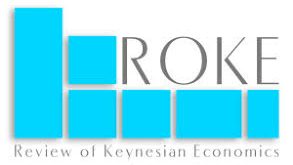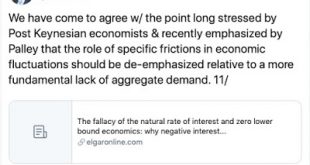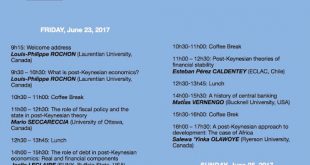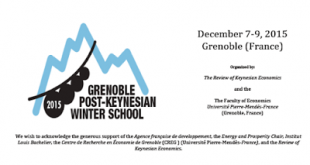The April Issue of the Review of Keynesian Economics is now out. The issue contains a collection of articles covering a spectrum of important issues. It opens with a debate over New Developmentalism which pits development relying on macro prices (especially the exchange rate) against historical state-led development policies. Next, there is an article on the role of the wage share in determining exchange rates. Thereafter, there are several articles on Post Keynesian growth theory. One...
Read More »Thirlwall at 40
Thirlwall and McCombie The new issue of ROKE is out. Three papers are freely downloadable (linked below). Check it out!Thirlwall's law at 40 by Esteban Pérez Caldentey and Matías VernengoWhy Thirlwall's law is not a tautology: more on the debate over the law by J.S.L. McCombieThoughts on the balance-of-payments-constrained growth after 40 years by A.P. Thirlwall
Read More »Larry Summers on Effective Demand
On of the issues between more mainstream Keynesians and their more heterodox counterparts is whether frictions are central for Keynesian results or not. Since the Neoclassical Synthesis the conventional view is that some rigidity or friction was behind the problems of unemployment, be that the liquidity trap (the Keynesian case with the flat LM, since Hicks 1937), the rigidity of wages (since Modigliani 1944), or some other coordination problem (mostly in the New Keynesian literature).In...
Read More »Basil Moore (1933-2018)
Basil Moore I first met Basil in 2000 or 2001, which was quite late, since I've read his work as an undergraduate back in the late 1980s. I was Assistant Director of the Center for Economic Policy Analysis (CEPA, now the Schwartz Center) at the New School, and we invited him for a talk, which was about his forthcoming (at that time) book Shaking the Invisible Hand: Complexity, Endogenous Money and Exogenous Interest Rates which was published considerably later (my review here).Basil...
Read More »Post Keynesian Summer School in Toronto next week
Updated program below. I'll be discussing the history of central banks. This is parallel to the HES conference.
Read More »Summer School at the Universidad de Valladolid
Organized by the Asociación de Economía Crítica, the organization that publishes the Revista de Economía Crítica (last issue online here; I'm on the board). I will teach on post-Keynesian views of the crisis, on the same day as Gérard Duménil , who will do a similar thing for Marxist approaches, I imagine. Program and registration form here.
Read More »Misconceptions about Heterodox Economics in general and Sraffian in particular
I had discussed before the meaning of heterodox economics. I suggested a definition based on positive contributions (rather than as a critique of the mainstream) and based on concepts rather than schools of thought. In my view the two principles that were central for defining heterodoxy were the Principle of Effective Demand (PED), based on Keynes and Kalecki's ideas, and the idea that distribution is the result of class conflict, which in my view is best expressed in Sraffa's recovery of...
Read More »Grenoble Post Keynesian Winter School
For more info go here.
Read More »Grenoble Winter School– December 7-9
Did anyone notice the global financial crisis of 2007–2008?
By Paul DavidsonOn November 4, 2008, at the dedication of a new building, Queen Elizabeth of Great Britain visited the London School of Economics (LSE). While there she was given a briefing by academics at the LSE on the origins and effects of the global financial crisis and its resulting turmoil in international financial markets. The Queen is reported to have asked, “Why did nobody notice it developing?” The director of research at LSE told her, “At every stage someone was relying on...
Read More » Heterodox
Heterodox








